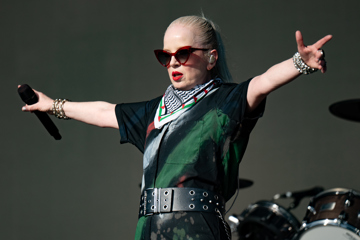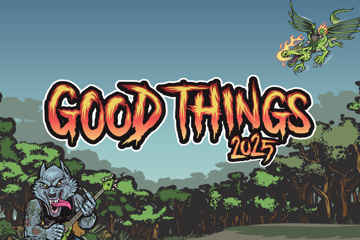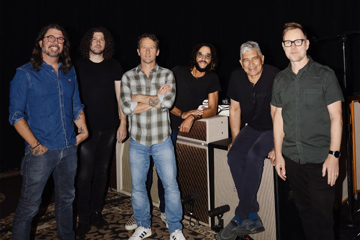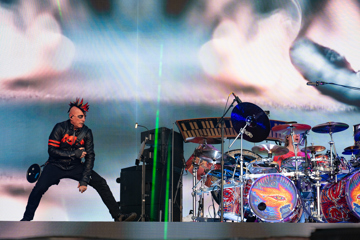On Dysfunctional Characters, Gender Inequality In Hollywood And Barbie
"It's my mission. It's really important to me to write female-driven stories and I hope to continue to do it."
It's not just female-driven stories that are 37-year-old Diablo Cody's focus. Cody, aka Brook Busey-Maurio, has written characters that have been described as "unlikeable", or "unsympathetic", a descriptor that only seems to apply to women. She says she feels she has a "responsibility to write those characters".
"Dysfunctional people are more interesting. In real life I don't know anybody who has sunshine coming out of their arse."
"I occasionally think I'm not capable of doing anything else — I try to write sympathetic characters who are mature and sensible and they inevitably morph into these immature, messed-up, negative people. I think it's just more interesting, y'know. Dysfunctional people are more interesting.
Don't miss a beat with our FREE daily newsletter
"In real life I don't know anybody who has sunshine coming out of their arse — everybody's complicated. It should be the norm [to write dysfunctional female characters], and I think it is becoming more common... I've seen some incredible performances in the last couple of years in really complicated roles, and I think things are changing. I hope."
Busey-Maurio is warm and chatty on the phone; she's frank but never rude, personable. She makes you feel at ease, and is surprisingly coy about her talents, reluctant to give advice due to her own odd career trajectory, its ups and downs — from stripper/blogger/journalist to full-time screenwriter; and from Academy Award winner for her first film Juno, to the writer/director of Paradise: a film starring Russell Brand that's (deservedly) vanished into obscurity. All she is willing to say is that now anyone can make a movie with their iPhone: "You don't have to have a rich dad to make a movie."
She's the type of writer who puts pieces of herself into her films. "I feel like writing is the most vulnerable thing that I can do. There's always a cringe factor — any time I have a movie come out I'm embarrassed, because it is so personal, and I am putting my own emotions out there every time. I'm not writing biopics about American presidents, I'm writing very emotional stories that reflect on what I'm feeling. It's scary every single time, it's like publishing your diary in a way. "
Busey-Maurio's latest, Ricki And The Flash, directed by Jonathan Demme, stars Meryl Streep as a failed LA musician with delusions of grandeur who returns to Indiana to support her grieving daughter (played by Streep's actual daughter, Mamie Gummer). Busey-Maurio explains how she related to this character, even though she does not yet have adult children.
"I do know what it's like to regret decisions that you've made, and I know what it's like to feel anxiety about what kind of mother you are, which is something that I deal with every single day with my own kids. I was projecting my own anxiety on this movie, I was thinking about the future, and I was wondering if I'll regret the fact that I've spent so much time writing movies and producing movies and following my dream, when I do have small children, and there are days where it's really difficult to figure out that balance between work and life. I don't know if I'm doing it right; I'm not going to know for a long time. Chances are I'm going to screw something up — I'm going to have some regrets, and I'm grappling with what those regrets might be, so that was how this story came about.
"You have to wonder: why are the women taking on that burden? It's because it's expected of us."
"For some reason we've accepted that men are providers, and that occasionally they need to go away from their children in order to provide, or in order to pursue professional success. And if a woman does that it's seen as really selfish. It's something that I really experienced working in Hollywood. I know tons of men who are writers and directors and when they have a movie in production they go on location and their kids stay home with their wives. The women that I know who are writers and directors and producers, when they go on location, they bring their children with them, which is incredibly stressful and expensive. You have to wonder: why are the women taking on that burden? It's because it's expected of us."
Cody says the only way to shift this expectation is for people to change their perceptions and attitudes, to "accept there are a lot more women assuming the breadwinner role in their families these days. Sometimes I have to be away from my family because — I shouldn't say I'm the primary provider because my husband works as well, but — my job is important: it's not a hobby".
Busey-Maurio's next project is the Barbie live-action movie. "I am a huge Barbie fan. I've been obsessed with the Barbie mythos since I was a kid. I think I'm really honoured that I was chosen to do this, because I don't think I was the most obvious choice, and I think it could be a really interesting take on Barbie, but also true to everything that we love about her."
She says that she'd love to write another movie about teenagers, a la Juno, but "it would be difficult for me to do at 37. I don't know if I could possibly relate to the Snapchat generation. One of the things I loved about Juno was there was no technology in that movie. I think she even used a pay phone at one point. We managed to completely avoid that trap of teenage texting. I don't even know if you could do that in 2015... I would love to take a crack at writing a movie about teens and millennials, but the last thing I want to do is look like the aging hipster who's trying to stay in touch, which is exactly what I am."







